A’Studio
- “Julia” and everything related to thatThe song “Julia” was recorded, which later became A’Studio’s first All-Union hit. It was thanks to this composition that Alla Pugacheva noticed Almata band and invited them to work at the Song Theater. 1989 was the year of A’Studio’s birth. A’Studio band performed for the first time at the Christmas Meetings of ‘90s that took place in SC Olimpiysky on December 2-17. The musicians performed the songs “Julia” and “Malish”. “A’Studio worked at Alla Pugacheva’s Song Theater until 1994.
- Baygali Serkebayev:“One day we were sitting in our rehearsal room at Kazakhconcert with Batyr, just the two of us. It was a small room full of instruments – there weren’t many of them: our favorite Yamaha DX7 synthesizer, electronic drums, a Casio rhythm machine. We were sitting around, talking about something, and at some point we decided to play. I went over to the Casio and scored this beat – if it was now, I’d say I was a beat maker – scored a beat that then turned it into a song called “Julia”. Then I played the harmony of the verse on my Yamaha and started playing the riff – the famous riff with honer-clavinet sound. Batyr started humming, fumbling with the melody. We felt the drive. The very pattern of the song somehow got us very excited. We turned on the dictaphone and recorded those first moments. And the next day, when we got together for rehearsal, we listened to the recording again. There was something missing in the song. And I suggested including a repeating phrase with parallel tertias, on which the lyrics of “Julia” were based. Anyway, the music was ready and we didn’t know what to do with it, because there were no lyrics. Batyr and I came up with the music, but we composed the lyrics much later. To record the demo tape, Batyr sang it all, as we say, ‘in a bird’s language’. And in the chorus, where the word “Julia” comes, he sang something that sounded like the word ‘virgin’, a set of pseudo-English words. After a while, our friend Timur Tezikpayev, who spoke English, came to us and said: “What are you singing there? Do you even know what does “virgin” mean in Russian?” We had no idea what the word ‘virgin’ meant. He says, “It’s a virgin!” We laughed – how about that. Anyway, it was all forgotten, we went on tour, checked into a hotel, we were supposed to have a concert the next day. But we really wanted to do this song. And we all got together in the room at night, with a glass of tea, started thinking about what it could be about. And this combination of the letters ‘d’ and ‘j’ apparently prompted Volodya Miklosic, and he suggested “Julia”. Instead of ‘virgin’. And they began to think – who is Julia, what does Julia have to do with it, what can be associated with Julia. Vova went to his room for a while and came back with a scrap of paper on which the words of the song “Julia” had been written. He worked them out before morning, and that night we performed it for the first time at a concert – I think it was some kinds of women’s pedagogical university. And we knew right away that it was the bomb. Because the hall simply exploded.”
The first shooting of the performance of the song “Julia” – “Tamasha” program, 1989
- Phillip Kirkorov brought Alla Pugacheva a cassette with “Julia” from Kazakhstan and a story about how this song was given to him by restaurant musicians. Alla Borisovna was surprised by the high quality of the recording, “If these guys play so well in a restaurant and sing so great, why should they give you a song? Let them come and sing at the “Christmas Meetings” themselves then.” Vladimir Presnaykov went to Alma-Ata to find out in what restaurant the nuggets played. It turned out that there was no restaurant, but the band, according to Presnaykov, was terrific. The guys moved to Moscow and began working under the patronage of Pugacheva, who had a flair for talent.
- The diva recalls working with Batyr:“… that time is a holy time for me, when he sang at A’Studio. All those songs that were performed, and his unique voice, his charm, his professionalism. And his talent. That’s a genius guy!»
Visit to Moscow, April 15, 1989
- Baygali Serkebayev:“I remember, after Volodya Presnaykov found us, Batyr and I flew to Moscow to meet Alla Borisovna: we got two plane tickets and came to Tverskaya. We bought flowers, went up in an elevator, came to the door and froze. We stood there for a few seconds, looking at each other, because we were scared. Then we rang the bell and heard the footsteps approaching. Our knees shook for some reason. And I remember how we talked very warmly afterwards, how we showed our song. And Alla Borisovna told us: “All right, guys. You have good music. I’ll think of something”. And when we got out of the entrance hall, we ran without saying a word to each other for, I guess, two or three blocks down Brestskaya street. And we didn’t say anything to each other. And then we stopped and said, “Why are we running at all? Where are we running to?”
Performance at Asia Dauysy
- Roman Reifeld:“As a high school student I worked at the Golos Azii. I remember rockers came – Rondo, Brigada S – Sukachev, Alexander Ivanov, Olga Kormukhina. They were all at their peak. And of course, the beautiful diamond among them – our A’Studio. They already had a year, maybe two in Moscow, at the Pugacheva Theater. They were very stylish. They were intelligent. They, unlike the rockers, had a different language – they were from a different cultural environment, their families didn’t talk like that. They had different music, different lyrics, a different level.”
“Asia dauysy”
Annual international music contest that was held at Medeo in Almaty from 1990 to 2004. It gave the region a bright and generous musical event, which unfolded on a huge rink area surrounded by summer mountains.
Annual international music contest that was held at Medeo in Almaty from 1990 to 2004. It gave the region a bright and generous musical event, which unfolded on a huge rink area surrounded by summer mountains.




Tour in Krivoy Rog

WITH ALLA PUGACHEVA AT THE TOUR IN MADRID

Tour in USa


At a musical festival in Japan
The album “Julia” (“Russkiy disk”) was released, which made the “girl from distant days” famous and became one of the romantic symbols of the 90s.

- Julia
- Bud ostorozhna
- Byl moy son
- Skazhi mne da
- Belaya reka
- Ya ne zabyl
- Sezon dozhdey
Джулия
- The lyrics to the songs “Belaya reka”, “Sezon dozhdey” and “Byl moy son” were written by the poet and composer Yerkesh Shakeyev (at that time he was a regular author of A’Studio), and the music - by Baygali Serkebayev, and in this sequence: first the music was born, then the lyrics. Each song was inspired by the story of personal experiences told by Serkebayev to Shakeyev. For example, the composition “Byl moy son” is dedicated to Serkebayev’s wife Raushan. Baygali Serkebayev considers it the best song he wrote. “Byl moy son” is little known to the general public, but musicians – in conservatories, in pop and jazz colleges – love to perform it.
Три дня назад растаял летний дым,
Как лёгкий взмах твоей руки.
И я за ним бежал все эти дни, эти дни.
Три дня назад исчез мой сладкий сон,
Тепло твоих дрожащих губ.
Но прошлых дней назад мне не вернуть,
Не вернуть.
Припев:
Был мой сон – были мы вдвоём.
Верни мне вновь свой голос,
Нашу любовь.
Опять в окне восход чужой луны,
Холодный взгляд молчащих стен,
Напомнит мне, что здесь бывала ты В те дни.
Три дня назад была ты так грустна.
Твой выбор был из двух дорог.
И не простив меня, в тот день ушла навсегда.
Как лёгкий взмах твоей руки.
И я за ним бежал все эти дни, эти дни.
Три дня назад исчез мой сладкий сон,
Тепло твоих дрожащих губ.
Но прошлых дней назад мне не вернуть,
Не вернуть.
Припев:
Был мой сон – были мы вдвоём.
Верни мне вновь свой голос,
Нашу любовь.
Опять в окне восход чужой луны,
Холодный взгляд молчащих стен,
Напомнит мне, что здесь бывала ты В те дни.
Три дня назад была ты так грустна.
Твой выбор был из двух дорог.
И не простив меня, в тот день ушла навсегда.
Припев:
Был мой сон – были мы вдвоём.
Верни мне вновь свой голос,
Нашу любовь.
Был мой сон – были мы вдвоём.
Верни мне вновь свой голос,
Нашу любовь.
Три дня назад исчез мой сладкий сон,
Тепло твоих дрожащих губ.
Но прошлых дней назад мне не вернуть,
Не вернуть.
Не вернуть.
Был мой сон – были мы вдвоём.
Верни мне вновь свой голос,
Нашу любовь.
Был мой сон – были мы вдвоём.
Верни мне вновь свой голос,
Нашу любовь.
Три дня назад исчез мой сладкий сон,
Тепло твоих дрожащих губ.
Но прошлых дней назад мне не вернуть,
Не вернуть.
Не вернуть.
- And there is a mystical story associated with the nationally popular “Sezon dozhdey”. Whenever the musicians started playing the song, it always rained. Once, when A’Studio was working as part of Pugacheva’s Theater, Alla Borisovna asked to play it at a concert. The musicians remembered the rainy omen, but the diva only brushed it off. However, even this time it rained! “Belaya reka” is one of A’Studio’s key compositions; the band ends their shows and concerts with this song to this day. Everyone thinks of it as almost a dance hit, but if you play it slowly, it’s a very sad song.
- Roman Reifeld:“The A’Studio’s tour in Almaty in the 90s. No matter where they performed – at the Opera and Ballet Theater, the Palace of Students or the Palace of Sports – the Almaty audience always received them very warmly. That warmth is there even now, when the generation that remembers their live performances gathers to sing the songs of the band.”


- The A’Studio album (Jeff Records) was released. In the same year the audience was presented with “Julia”, the musical film with the participation of the band. The film was shot in 1991 in four cities, including Alma-Ata, which was then still spelled with a hyphen. During the August filming in Odessa, there was a coup d’etat in the USSR, and by the time it was filmed in London, the Soviet Union ceased to exist.

Photo from the set of the “Julia” film
- Nikolay Postnikov, band photographer:“We left the Soviet Union for Great Britain and returned to a completely different country. So many years had passed, but to me it was like yesterday. I remember that our director wanted a white grand piano to appear in the film, which wasn’t available in Alma-Ata at the time, and even if it had been, I doubt anyone would have allowed it to be taken to Kapchagai and filmed, so our production designer painted a black grand piano white especially for the film.”
- The plot of the film is as follows: a young musician, played by Batyr, performs in a fashionable band, but dreams of another, A’Studio, whose concert he happened to attend and could not get their music out of his head. At the same time, a love line for the beautiful Julia (Irina Itskovich) develops. In the end, as in the song, the singer breaks up with his beloved, but reunites with A’Studio. It is noteworthy that in addition to the members of early A’Studio – Batyr, Baygali Serkebayev, Vladimir Miklosic, Baglan Sadvakassov and Igor Lutsiv – the singers who worked with the band at the Pugacheva Song Theater starred in the film. Among them were Alla Borisovna herself, Vladimir Presnyakov Jr., Angelika Varum and Sergey Chelobanov. All the events of the film, although dedicated to the early period of the band, are fictional and revolve around the lyrics of the “Julia” song.
- Daler Nazarov:“When I first saw A’Studio’s performance on central TV, I was impressed by the coherence and precision of the band. Everything was beautiful, the musicians were impressive with their skills. It seemed as if they had figured out some secret to the signature sound. It was as if the guys had broken the stereotype in the USSR. Batyr sang the songs very naturally in Russian, and they sounded somehow different without losing the comprehensibility of the words. I saw Batyr as the pulsating heart of the band, the living embodiment of a great love for music and his friends. And I was happy to tell everyone that we were friends with Batyr, and everyone to whom I told that, immediately became his friends”.


With Vladimir Presnyakov
Batyr as a member of “Starco”, Russian pop stars’ soccer club
The album “Soldat lyubvi” was released by Soyuz Studio, which included perhaps the most famous songs of A’Studio

- Eti teplie letnie dni
- Neznakomka
- Soldat lyubvi
- Serenada
- Osen
- Ya ne tvoy
- Ptica svobody
- Elegiya
- Stop, noch’
- Ostrov nadezhdy (with Alla Pugacheva, Sergey Chelobanov & Vladimir Presnyakov)


- Baygali Serkebayev:“Each of us, of course, had our own musical tastes, each of us grew up on this or that music. I grew up on The Beatles. I also listened to a lot of rock music, such as Deep Purple. Then came jazz. Najip also listened to a lot of The Beatles. Then he infected us with the direction of Depeche Mode. And we had a period when we played new wave music. Bulat Syzdykov loved Janis Joplin, Jimmy Hendrix. Batyr was very fond of Stevie Wonder. His favorite saxophonist was Stevie Sander. Volodya Miklosic also listened to a lot of The Beatles music, and Baga was a Beatles-man. It’s a huge musical horizon, different directions. And my job as a musical director was to put it all together. And to write arrangements that would be interesting for all of us. That’s why we combined different genres in our music: funk, jazz-rock, rock and some classical elements, of course. And when we were asked in what direction we play, we found a convenient answer: A’Studio band style.

Vladimir Mikloshich, Baglan Sadvakassov and Batyrkhan Shukenov.
It was followed by the A’Studio Live album

- Uvertyura (Live)
- Ostorozhna bud’ so mnoy
- Casino
- Sezon dozhdey
- Osen
- Byl moy son
- Neznakomka
- Ya veryu v tebya
- Korlan
- Ne kazni (with Murat Nasyrov)

On stage with Baglan Sadvakassov, Chisinau
- The album “Nelyubimaya” was recorded, the title song of which was heard from all radio and TV sets of the country.

- Devochka-tango
- Vchera
- Hudozhnik
- Osvobodi serdce moyo
- Nelyubimaya
- Korabli lyubvi
- Letniy liven’
- Yuzhnoye solnce
- Potancuy so mnoy
- Julia (Remix)

At the studio in London
- Vladimir Miklosic:“We wrote the album “Nelyubimaya” together with Greg Walsh. And then we understood what “working the English way” means. It means hanging out all night, and then getting up at eight in the morning and going to work in the studio with a “greased” head.”
The “Greshnaya strast” album was released on ORT-Records
- Vladimir Miklosic:“For the “Greshnaya strast” album we again invited Greg Walsh not only to mix, but also to record the tracks. We learned a lot from him and he learned a lot from us. I remember it was winter and it was very cold in Moscow. We brought a “goat” – a heater with a strung wire, and Walsh had never seen such in Britain and said, “But it can be very dangerous…”, but then he got used to it and warmed himself near it.”


Recording the album, with Greg Walsh at the piano
With Baygali Serkebayev at the studio

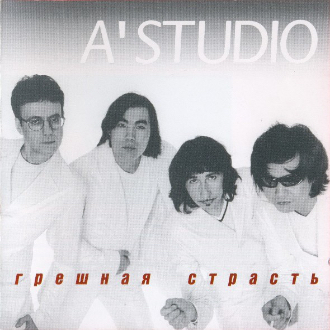
- Sneg v pustyne
- Leto v slezah
- V rayskom sadu
- Greshnaya strast
- Stan’ moey molitvoy
- Ty i ya
- Gavan’ moey lyubvi
- Kot na kryshe
- Moy drug
- Popurri
A’Studio’s style in different years
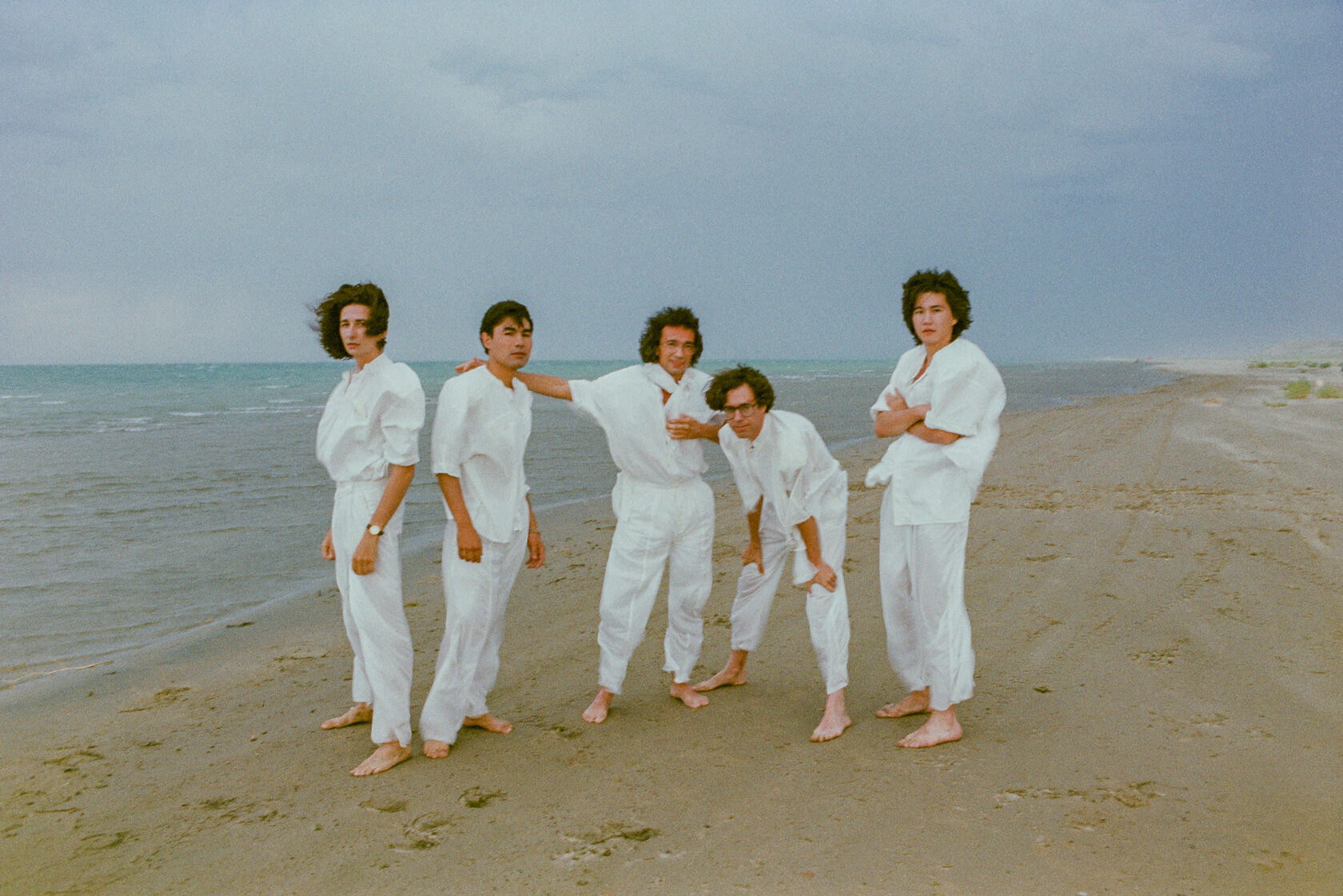
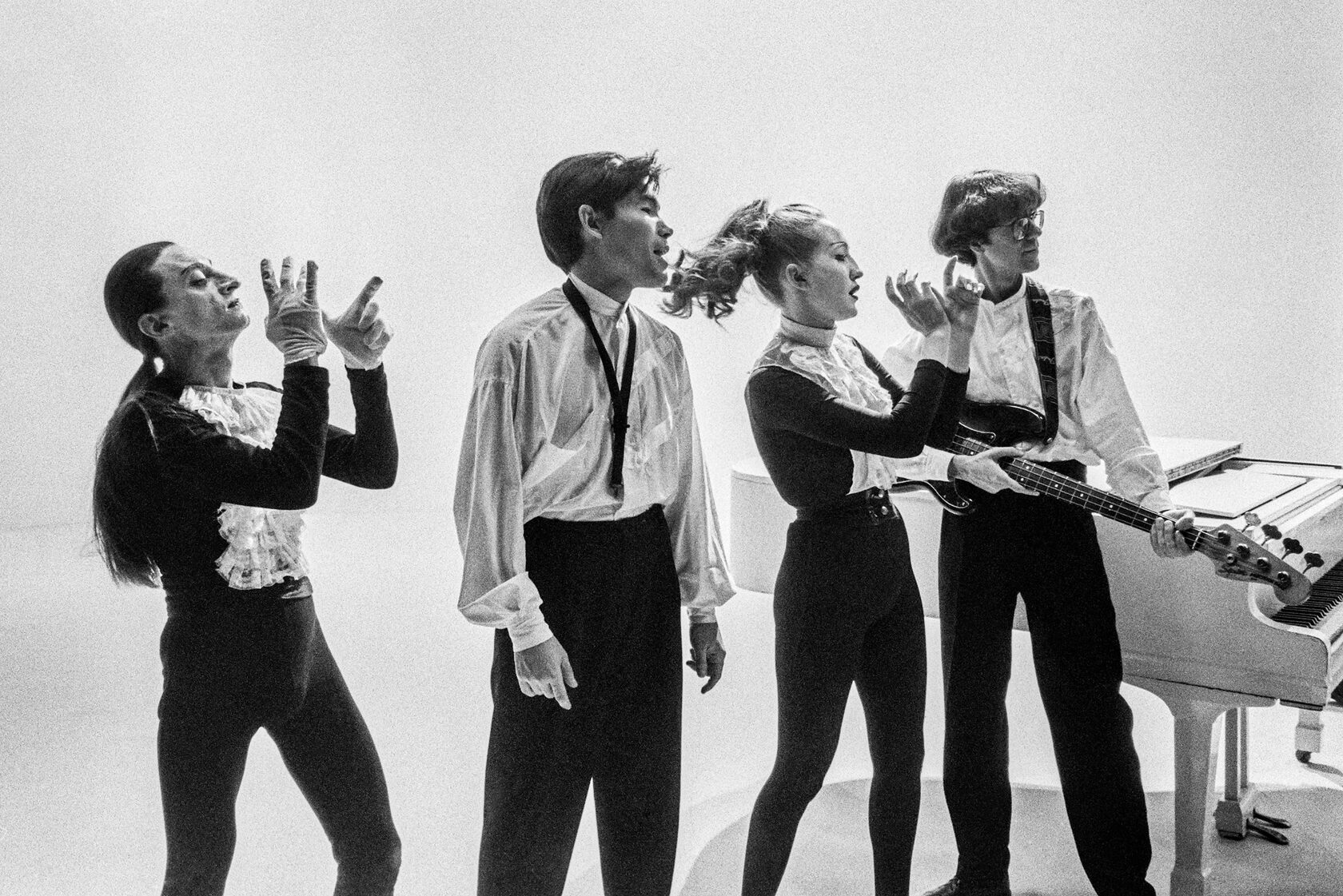
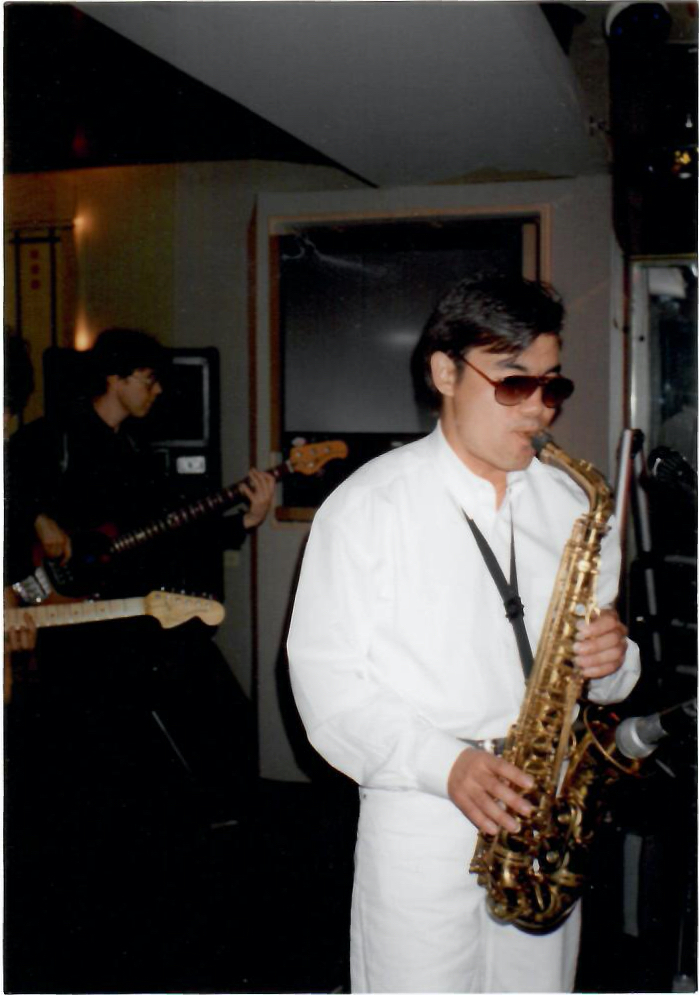
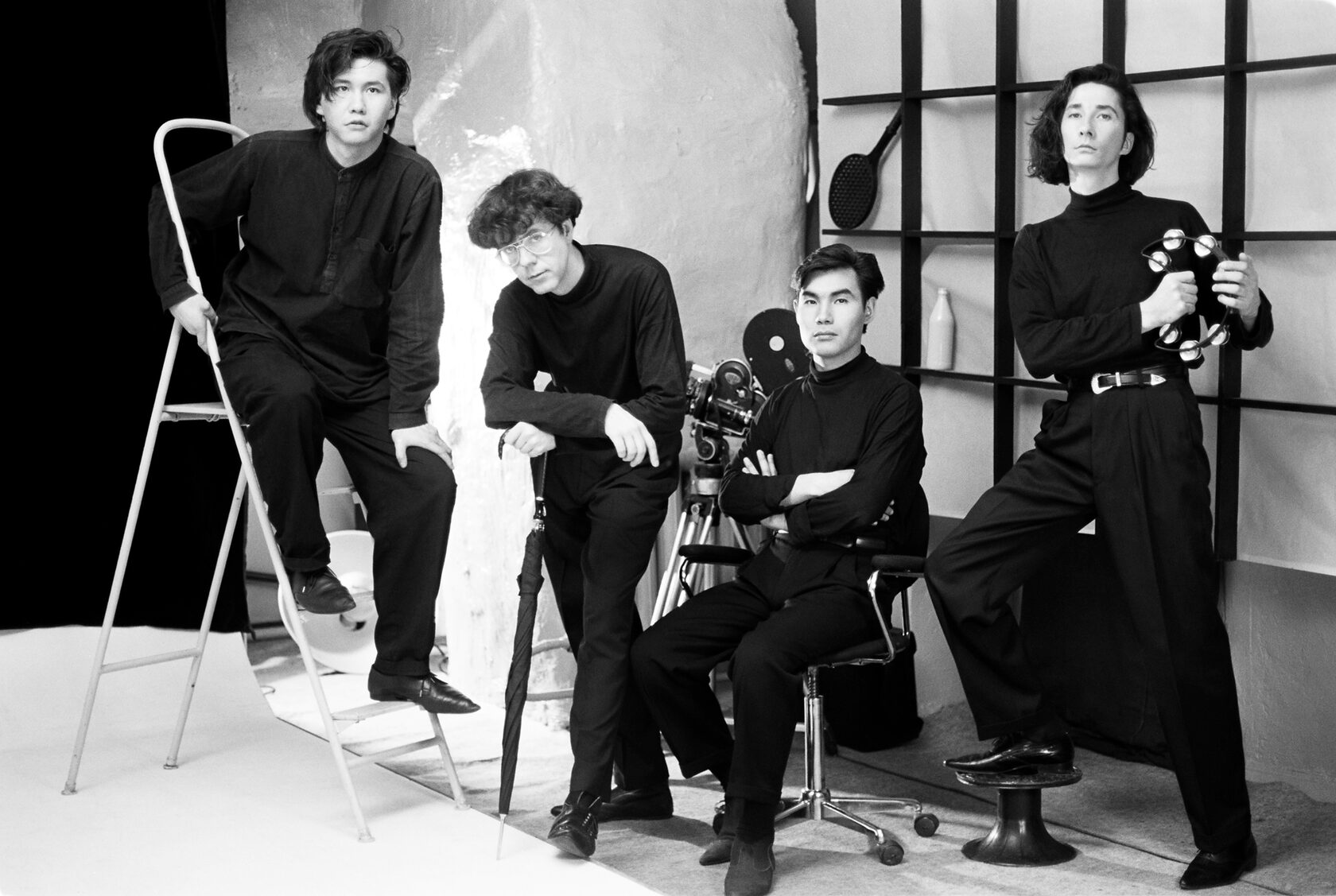
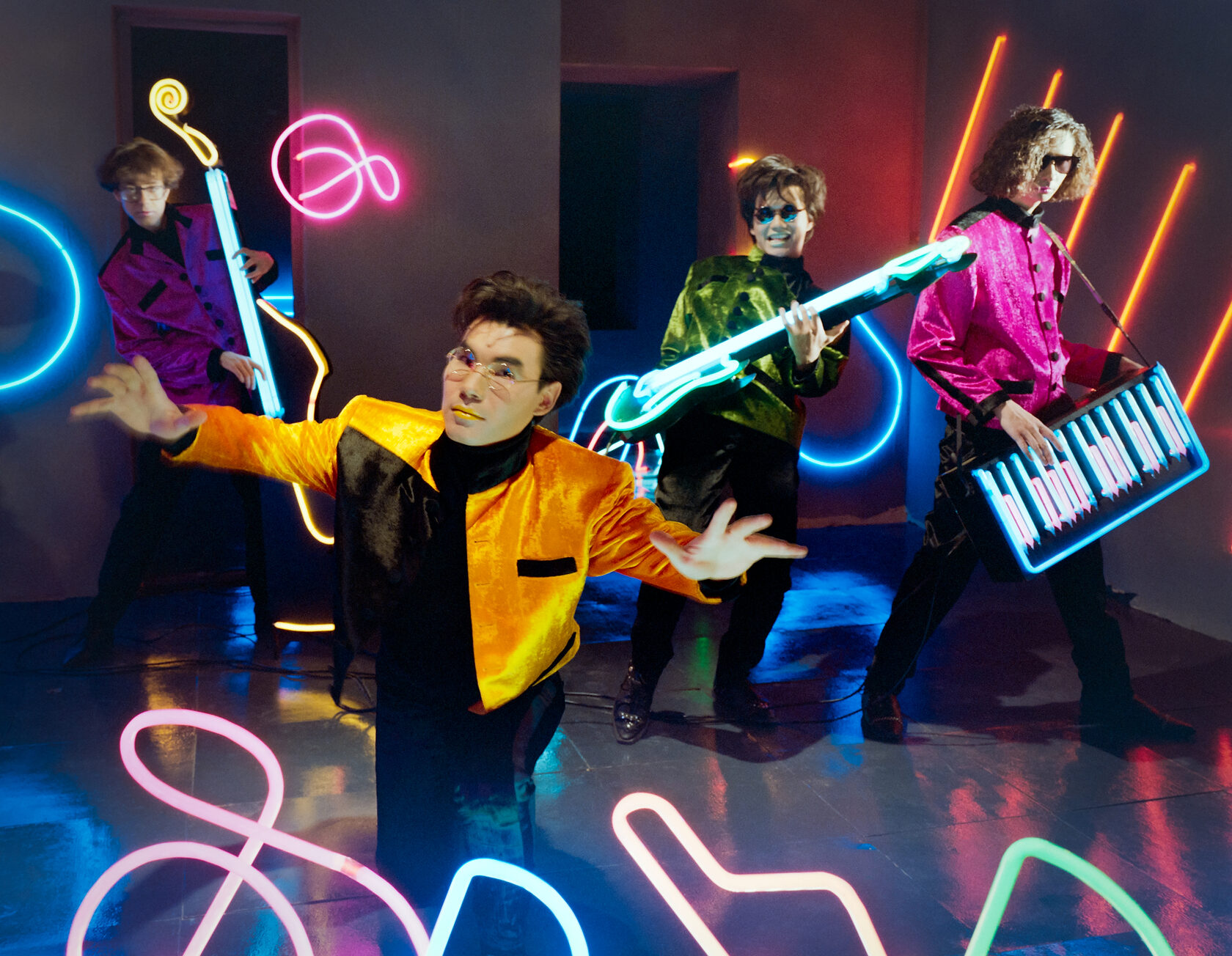
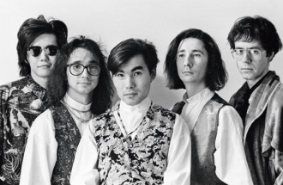


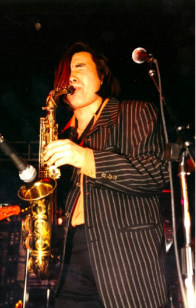

SHARE YOUR STORY






